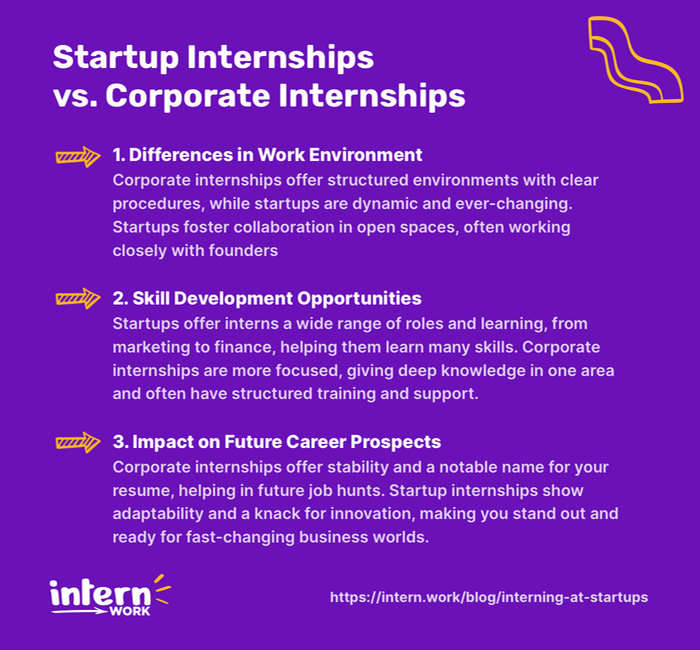
Are you ready to take on the exciting world of startups? Interning at a startup can be a thrilling adventure filled with unique experiences and opportunities for growth. But as with any adventure, there are pros and cons to consider. In this article, we’ll explore the ins and outs of interning at a startup, highlighting the benefits and challenges that come with it. So buckle up, and let’s dive in!
Understanding Startups
Before we headfirst into the pros and cons, let’s take a moment to understand what a startup is. Simply put, a startup is a young company in the early stages of its development. Startups are often founded by ambitious, innovative individuals looking to disrupt traditional industries with fresh ideas and novel approaches.
But what sets a startup apart from your average Joe company? Well, a startup is not just any ordinary business venture. It’s a thrilling rollercoaster ride fueled by passion, grit, and a touch of craziness. Startups are known for their zeal to tackle big problems and their constant pursuit of growth, typically in a fast-paced and dynamic environment.
What is a Startup?
A startup is not your average Joe company. It’s a venture on a rollercoaster ride fueled by passion, grit, and a touch of craziness. Startups are known for their zeal to tackle big problems and their constant pursuit of growth, typically in a fast-paced and dynamic environment.
Imagine a group of individuals coming together, fueled by a shared vision and a burning desire to make a difference. They are willing to take risks, face uncertainty, and work tirelessly to turn their ideas into reality. This is the essence of a startup.
Startups often operate in industries that are ripe for disruption. They challenge the status quo and aim to revolutionize how things are done. Whether through groundbreaking technology, innovative business models, or disruptive strategies, startups strive to create a lasting impact.
The Evolution of Startups
Startups have come a long way since their inception. The rise of technology and the internet has paved the way for a new breed of businesses. Gone are the days when startups were limited to the realms of Silicon Valley; now, they can be found in every corner of the globe, disrupting industries and challenging the status quo.
-
The Global Reach of Modern Startups
With the advent of digital platforms and the democratization of information, startups have gained unprecedented access to resources and global markets. This has opened up a world of possibilities, allowing entrepreneurs to turn their ideas into reality from virtually anywhere.
-
Beyond Tech: Addressing Social Challenges
Today, startups are not only focused on technological innovation but also on social and environmental impact. Many startups are driven by a mission to create a better world, addressing pressing issues such as climate change, poverty, and inequality.
-
The Innovative Culture of Startups
Furthermore, startups have become a hotbed for talent and creativity. They attract individuals excited about building something from scratch and making a meaningful contribution. Startups foster a culture of collaboration, experimentation, and continuous learning, creating an environment conducive to innovation.
Startups are much more than just young companies. They symbolize ambition, resilience, and the relentless pursuit of progress. They represent the spirit of entrepreneurship and believe anything is possible with passion and hard work.
The Benefits of Interning at a Startup
Now that we have a solid grasp on what startups are all about let’s explore the perks of interning at one.
Gaining Diverse Experience
Interning at a startup allows you to wear many hats and dip your toes into different business areas. Forget about the monotonous tasks that often come with corporate internships. At a startup, you can contribute to various projects, gaining valuable skills and insight. Every day, from marketing to product development, is an opportunity to learn something new.
For example, imagine being an intern at a tech startup. You might start your day by assisting the marketing team in creating engaging social media content to promote the company’s latest product. In the afternoon, you could join the product development team, brainstorming new features and providing valuable input based on your fresh perspective. By the end of the day, you might find yourself collaborating with the customer support team, gaining insights into customer needs, and helping to improve the overall user experience.
This diverse experience allows you to build a versatile skill set. It gives you a taste of different roles within a startup. It can help you discover your passion and guide your career path in the future.
Opportunities for Growth and Learning
Startups are all about growth, which also extends to their interns. As a startup intern, you’ll be part of a small team, so your impact and contributions will be quickly recognized. You’ll work with passionate and driven individuals, learning from their experiences and soaking up knowledge like a sponge.
Picture yourself in a startup environment where everyone is encouraged to share ideas and collaborate. Your input will be valued, and you’ll have the opportunity to impact the company’s growth. Whether proposing a new marketing strategy, suggesting a feature enhancement, or finding innovative solutions to challenges, your contributions will be taken seriously.
Moreover, startups often provide mentorship programs, pairing interns with experienced professionals who can guide and support them throughout their internship journey. These mentorship relationships can be invaluable, offering insights and advice that can shape your career trajectory.
Close-Knit Community and Culture
Startups foster a close-knit and collaborative environment, unlike the corporate world’s hierarchical structures. You’ll find yourself surrounded by like-minded individuals who share a common goal and are driven by a powerful camaraderie. The startup culture is about teamwork, innovation, and quirky fun!
Imagine working in an office where everyone is passionate about the company’s mission and willing to go the extra mile to succeed. Startups often have a flat organizational structure, allowing open communication and collaboration across different teams. This creates a sense of belonging and encourages everyone to contribute their ideas and perspectives.
In addition to the collaborative atmosphere, startups often have unique perks and activities contributing to their vibrant culture. From team-building outings and hackathons to casual dress codes and flexible work hours, startups know how to make work enjoyable and foster a positive work-life balance.
So, you will gain valuable experience and skills during your internship at a startup and be part of a community that supports and inspires you every step of the way.

Interning at a startup might be a great choice. You get to try many different jobs, learn a lot, and every day has something new. Being in a small team means your hard work gets noticed, and you can learn from passionate people. Startups feel like close families; everyone works and has fun together. They might even have extraordinary team events and flexible hours. So, it’s a place to learn, grow, and enjoy work!
The Challenges of Interning at a Startup
Interning at a startup sounds like a dream come true. However, it’s essential to be aware of the challenges of the startup experience.
1. Unpredictability and Risk
In the world of startups, one thing is sure: uncertainty. Startups often face unpredictable challenges and rapidly changing circumstances. The road to success is paved with countless twists and turns, and you’ll need to be ready to adapt and roll with the punches. This can be exciting, but it also comes with an inherent risk.
For example, imagine interning at a tech startup developing a groundbreaking new app. One day, you might be working on coding and debugging, and the next day, the entire project might pivot in a new direction. This level of unpredictability requires interns to be flexible and open-minded, as they may need to quickly switch gears and learn new skills to keep up with the ever-evolving startup landscape.
2. Potential for Overwork
As startups strive to make their mark on the world, they often operate on tight deadlines and limited resources. This can lead to long hours and intense workloads. While this can be an excellent opportunity for personal growth and development, it’s crucial to maintain a healthy work-life balance to avoid burnout.
Imagine interning at a fashion startup, preparing for a major runway show. The team works around the clock to finalize designs, coordinate logistics, and ensure everything is perfect for the big event. You might work extended hours as an intern, attend late-night fittings, and even help with last-minute alterations. While the experience can be exhilarating, it’s important to prioritize self-care and set boundaries to prevent exhaustion.
3. Lack of Structure and Formal Processes
The startup world may present some challenges if you thrive in a well-structured and organized environment. Startups are known for their agile and flexible nature, meaning formal processes and procedures might need to be established. This can be both a blessing and a curse, as it allows for creativity and innovation but also requires adaptability and a willingness to embrace ambiguity.
For instance, imagine interning at a food delivery startup constantly experimenting with new delivery models and customer engagement strategies. The lack of rigid structure means you might be free to propose and implement your own ideas. Still, it also means there might be unclear guidelines or established workflows. As an intern, you must be comfortable taking the initiative and navigating uncharted territory.
Additionally, startups often operate in a fast-paced environment where decisions are made on the fly. You might work on multiple projects simultaneously, with shifting priorities and deadlines. While this can be invigorating for some, it can also be overwhelming for others who prefer a more structured and systematic approach.

Interning at a startup can be a thrilling and rewarding experience. However, it’s important to recognize and prepare for the unique challenges that come with it. By embracing uncertainty, managing your workload effectively, and adapting to a less structured environment, you can make the most of your internship and set yourself up for success in the dynamic world of startups.
Comparing Startup Internships with Corporate Internships
Curious how interning at a startup stacks up against a traditional corporate internship? Let’s break it down.
1. Differences in the Work Environment
You can expect a more structured and established work environment at a corporate internship. Processes and procedures are often clearly defined, providing a sense of stability. However, in a startup, the work environment is quite different. Startups are known for their dynamic and fast-paced nature, where change is the only constant.
The need for established processes and procedures can be both exciting and challenging. It requires interns to adapt quickly and be flexible in their approach. Despite the potential chaos, many interns thrive in this environment, finding it invigorating and stimulating.
In a corporate internship, you may work in a cubicle or office space, surrounded by other employees. The hierarchical structure is often evident, with clear reporting lines and defined roles. On the other hand, startups often have open office spaces, fostering collaboration and camaraderie. Interns may work alongside the company’s founders and other team members, gaining valuable insights and building strong professional relationships.
2. Skill Development Opportunities
While corporate and startup internships offer valuable learning experiences, startups provide broader skill development opportunities. With limited resources and lean teams, startups allow interns to take on roles and responsibilities they might need access to in a corporate setting.
As an intern at a startup, you might find yourself involved in various aspects of the business, such as marketing, product development, customer service, and even financial planning. This exposure allows interns to develop a versatile skill set and better understand how different functions within a company work together.
In a corporate internship, interns may have a more specialized role, focusing on a specific department or task. This can provide a deep dive into a particular area of interest, allowing for in-depth skill development. Corporate internships often have structured training programs and mentorship opportunities, providing interns with guidance and support throughout their internships.
3. Impact on Future Career Prospects
Choosing between a startup internship and a corporate internship can impact your future career prospects. Corporate internships can provide stability and a recognized brand name on your resume, making it easier to land future job opportunities. The reputation and resources of a well-established company can open doors and attract potential employers.
On the other hand, a startup internship can demonstrate your adaptability, resilience, and entrepreneurial spirit, which can be impressive to specific employers or even lead to your own entrepreneurial ventures.
Startups are often associated with innovation and disruption, and having firsthand experience in such an environment can set you apart from other candidates. The ability to navigate ambiguity and embrace change can be precious in today’s rapidly evolving business landscape.

The choice between a startup internship and a corporate internship depends on your personal preferences, career goals, and the skills you want to develop. Both options have their unique advantages and can provide valuable learning experiences. It’s essential to consider your strengths, interests, and long-term aspirations when making this decision.
Is a Startup Internship Right for You?
Now that you’ve heard the pros and cons of interning at a startup, it’s time to reflect and decide.
1. Assess Your Career Goals
Start by taking a deep dive into your career goals and personal preferences. Reflect on what drives you and what you hope to achieve from your internship experience. Consider factors such as the type of work environment you thrive in, the level of risk you’re comfortable with, and your appetite for experimentation.
2. Evaluate the Startup’s Potential
If you decide that a startup internship aligns with your goals and preferences, evaluating the startup itself is crucial. Look into the startup’s vision, product/service market fit, and funding situation. Evaluate their growth potential and stability to ensure you make an informed decision.
3. Prepare for the Startup Culture
Lastly, be ready to embrace the startup culture and pace. It’s a world where things move quickly, ideas are celebrated, and failures are seen as stepping stones to success. Embrace the rollercoaster, bring your passion and curiosity, and prepare to make your mark.
Interning at a startup can be a thrilling and transformative experience. It’s a chance to work alongside passionate individuals who are out to change the world. While pros and cons exist, the potential for growth, learning, and impact is undeniable. If you’re up for the challenge and eager to dive into the world of startups, go ahead and seize the opportunity. Your startup adventure awaits!
Key Takeaways
- Startups are young companies founded by innovative individuals aiming to disrupt conventional industries with fresh ideas. These ventures thrive in fast-paced, growth-oriented environments, challenging norms and pursuing ambitious goals. Their essence lies in passion, resilience, and a willingness to tackle significant problems.
- Evolution and Global Impact: Once limited to Silicon Valley, startups now span the globe due to technology and the internet. They focus not only on technological innovation but also on addressing social and environmental issues. The potential for impact is not confined by geography, and startups strive to make a difference on a global scale.
- Startup internships offer diverse experiences where interns engage in various aspects of the business, building versatile skill sets. Opportunities for growth and learning arise as interns collaborate with passionate individuals, often contributing to critical decisions. The close-knit community and culture foster a supportive environment that enhances personal development.
- Interning at a startup involves uncertainties and rapid changes, requiring adaptability. Overwork can be challenging as startups work towards their goals, demanding long hours and intense dedication. Additionally, the lack of formal structures necessitates a proactive and adaptable approach.
- Startup and corporate internships differ in work environments, with startups offering dynamic, collaborative spaces while corporations provide structured stability. Skill development in startups spans various areas due to lean teams, while corporate internships offer focused training. The choice between the two impacts future career prospects, with corporate stability versus startup innovation.






